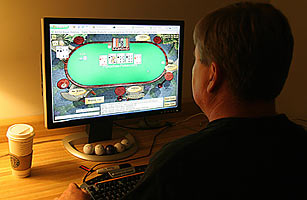
It’s not often that the federal government shuts down the only means of income for hundreds of thousands of hard-working Americans.
Naturally, then, on April 15, when the FBI pulled the plug on PokerStars, Full Tilt Poker, Ultimate Bet and Absolute Poker, the four largest offshore online-poker sites serving U.S. players, full-time online pro Isaac Haxton started thinking about moving overseas. Among the initial batch of candidates: Melbourne, Malta and Madrid — all cities in nations that allow gambling online. “Ultimately, it doesn’t really matter where I end up,” said the 25-year-old Haxton, who currently lives in Las Vegas. “So long as I can get myself to a country with good Internet connections, a country that allows me to earn a living again, I’m there.”
Life has changed drastically for professional online-poker players in the wake of what many are calling “Black Friday.” One day, it was business as usual for regular players: 10 to 15 tables at a time, roughly 500 hands per hour, tens of thousands of dollars in play. The next day, nothing, not even a single virtual chip.
Before the shutdown, the Poker Players Alliance, a nonprofit based in Washington, D.C., which advocates for the right to play poker online, boasted that as many as 10 million Americans played on computerized felt. Earlier this week, John Pappas, the group’s executive director, estimated the current number is no higher than 2 million.
Poker players have responded to this threat to their livelihood the same way they might respond to aggressive opponents at the table — evasively, rationally and, above all else, tactically.
Most smaller-stakes players — people who earn between $40,000 and $80,000 annually from online poker — have improvised, spending more time playing live cash games in local card rooms or moving money